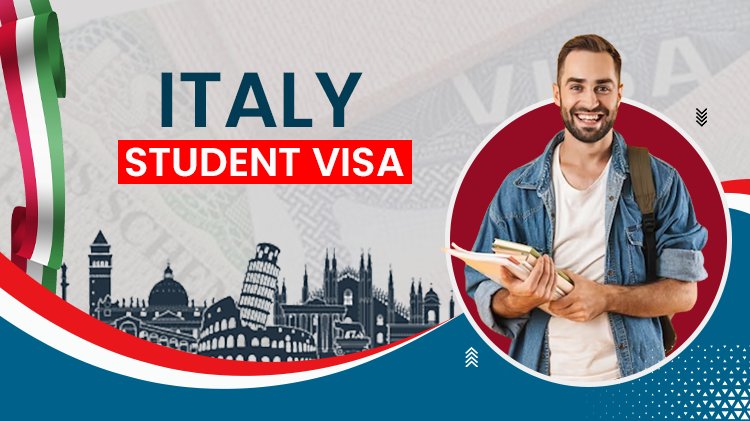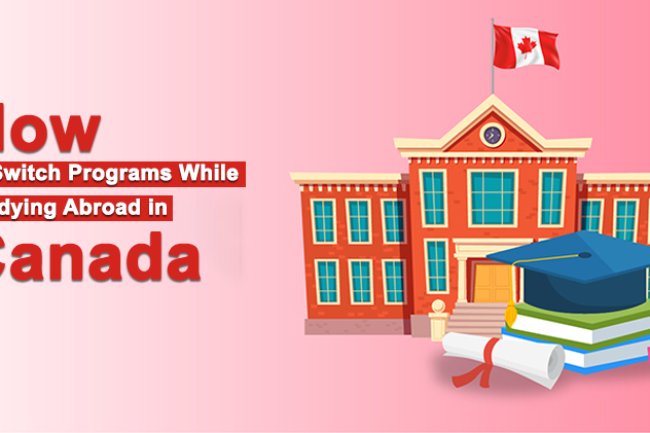Italy Student Visa
To obtain Italy Student Visa, you will need to follow a specific process and fulfill certain requirements.

Due to its esteemed educational institutions and extensive cultural past, Italy is a popular destination for overseas students seeking a good education. If you're considering studying in Italy, the process of obtaining a student visa is essential. In this blog post, we will go into great detail about each requirement for an Italy student visa in order to provide you a complete understanding of the application process.
Acceptance at an Italian Educational Institution:
The first requirement for an Italy student visa is obtaining admission to a respected Italian educational institution. This category may include colleges, universities, language schools, and other specialty educational programmes. You must have an official letter of acceptance or enrollment confirmation from the university you'll be attending.
Valid Passport:
You need a passport that is at least six months older than the estimated length of your stay in Italy in order to apply for a student visa. Check to see if your passport satisfies this requirement before starting the visa application procedure. The passport must be valid for at least six months after the anticipated end of your stay in Italy. This criterion was put in place to make sure that your passport would remain valid for the duration of your vacation and would permit unrestricted movement. Check your passport's expiration date and, if necessary, renew it to make sure it matches the requirements for minimum validity before beginning the visa application procedure.
If you don't have a current passport, your visa application could be delayed or rejected. Therefore, before requesting a student visa for Italy, check the expiration date on your passport and, if necessary, take the necessary actions to renew it.
Visa Application Form:
Fill out the Italian student visa application completely and precisely. The application form is available on the official website of Italy as well as at the Italian consulate or embassy in your country. For the sake of avoiding any delays or issues, ensure that all the necessary fields are filled out completely. For the application process for a student visa to Italy, the application form is required. For the application process to go as smoothly as possible, the application form must be filled out completely and precisely. The application form can be obtained from the consulate of the University Bureau or the Italian embassy, or it can be accessed from their official website.
Give the application as much accurate, exact, and current information as you can. Personal details (such as name, birthdate, and nationality), contact information, educational history, the course of study you plan to pursue in Italy, and the length of your stay are sometimes required.
Make sure to thoroughly read the instructions and to include all required supporting documents as specified in the application form. Your visa application may be delayed or even refused if there are any mistakes or missing information. It is essential to take the time to correctly fill out the application and to double-check all the information before submitting it in order to ensure a smooth application for a visa.
Passport-Sized Photographs:
You are need to submit current passport-size pictures in accordance with the conditions set forth by the Italian authorities. It is advisable to have multiple copies of the images on hand because they can be required at various stages of the application procedure.
Provide evidence of your financial resources to prove you have what you need to support yourself while travelling in Italy. This could take the form of bank statements, scholarship awards, sponsorship paperwork, or any other documents that show you have the financial resources to cover the cost of tuition, housing, and living expenses.
Coverage under Health Insurance
Get Italy adequate, comprehensive health insurance. The insurance should provide coverage for repatriation, emergency situations, and medical expenses. You will need to provide evidence of this insurance when applying for a student visa.
Accommodation
Provide proof of your accommodations in Italy. Acceptable evidence includes a lease agreement, a letter of accommodation from your school, or a letter from your host attesting to your residency throughout your studies.
Academic Transcripts and Certificates:
Your academic transcripts, diplomas, or certifications from former institutions of higher learning are a significant requirement for the Italy student visa application. These documents greatly help your application and attest to your academic background.
Make sure your academic records are official and contain information like the name of the school, the length of the course, the grades or marks received, and the study programme. Verified translations could be needed if your transcripts aren't in Italian.
Mentioning any certificates or other credentials you have that are related to your field of study is also a smart idea. These supplemental documents could demonstrate your expertise in and commitment to your field of study.
Make sure each document is authentic, properly notarized, and, if required, translated into Italian. Your chances of being granted an Italy student visa will increase if you submit accurate and thorough academic transcripts and certificates with your application.
Language Proficiency:
There are strict language requirements for the Italian student visa, especially if the course you want to take is taught in either Italian or English. Depending on the exact language requirements of your educational institution or programme, you may be needed to provide documentation of your language skills.
Two popular language tests for determining English language competency are the Test of English as a Foreign Language (TOEFL) and the International English Language Testing System (IELTS). Your proficiency in speaking, hearing, reading, and writing English is evaluated on these tests. It is advisable to ask the institution or programme you have chosen about the basic score requirements for language proficiency.
Similar to that, if your course is taught in Italian, you might need to provide proof of your language proficiency. Passing accepted language examinations, such as the CELI (Certificato di Conoscenza della Lingua Italiana) or the CILS (Certificazione di Italiano como Lingua Straniera), can demonstrate your proficiency in this language. Confirming the particular language requirements of your educational facility or programme is vital once more.
Your language proficiency tests' results might not be available right away, so plan ahead and schedule them well in advance. Your visa application will be supported by providing reliable proof of your language skills, which will show that you are qualified to study in Italy.
Visa Fee Payment:
Pay the required visa cost when you submit your application. The charge amount may vary based on your nationality and the length of your projected stay in Italy. Make that you have the necessary funds on hand to cover this expense.
Conclusion:
Applying for a student visa to Italy requires thorough preparation and attention to detail. By meeting the prerequisites, which include being accepted at an Italian educational institution, having a current passport, accurately filling out the application form, supplying the required documents, and demonstrating your financial capability and health insurance coverage, you can increase your chances of being granted an Italy student visa. It is crucial to start the application process well in advance in order to allow ample time for processing. Don't forget to visit the official website of the Italian consulate or embassy in your country for the most up-to-date information and directions. I hope your Italian studies go well!
FAQs
1. Do I need a student visa to study in Italy?
If you are a citizen of a nation outside of the European Union (EU) or the European Economic Area (EEA), then you must obtain a student visa in order to study in Italy.
2. What prerequisites must be satisfied to acquire an Italian student visa?
The requirements may vary depending on your nation, but generally speaking, you'll need a valid passport, a letter of admission from an Italian university, confirmation of your financial stability, proof of health insurance, and a finished visa application form.
3. How can I apply for an Italian student visa?
To apply for an Italy student visa, you must do so at the Italian consulate or embassy in your home country or the country where you are currently residing legally.
4. Is it possible to apply for a student visa before receiving an admission letter from an Italian university?
No, you must first be accepted to a school in Italy and receive an acceptance letter before applying for a student visa there.
5. How long does it take to get a student visa for Italy?
Although it can change, the processing period typically lasts between 30 and 90 days. You should submit your application well in advance of the deadline.
6. Is there an upper age limit to apply for an Italian student visa?
When applying for a student visa to Italy, age limitations are not relevant. You may apply regardless of your age as long as you satisfy the other requirements.
7. Must I provide proof of my capacity to cover the whole cost of my studies in Italy?
Yes, you need to provide proof that you have enough cash to cover your tuition, living costs, and return travel for the entire period you'll be studying in Italy.
8. How much money is absolutely necessary to obtain a student visa for Italy?
It is normally advised to have between €5,000 and €7,000 available annually for living expenses, while the absolute minimum amount needed can vary.
9. Can I work part-time while I'm a student in Italy using my student visa?
Yes, you are allowed to work a set number of part-time hours each week as a student with a valid study visa. The specific requirements and restrictions for student part-time employment in Italy must, however, be confirmed.
10. Is health insurance necessary for an Italy student visa?
Yes, health insurance is necessary to obtain an Italian student visa. You'll need to provide documentation of health insurance that covers expenses for medical care in Italy.
11. What language proficiency proof is necessary for an Italy student visa?
The language proficiency requirements of various universities may vary depending on your selected programme and educational environment. You may generally be asked to provide the results of language exams like the IELTS or TOEFL or other qualifications in an official language.
12. Can I apply for an Italian student visa without having a valid passport?
No, you need a passport that is at least six months more valid than the anticipated length of your stay in Italy in order to apply for a student visa.
13. Must I reserve a specific type of accomodation before applying for an Italy student visa?
A lease or a letter of accommodation from your school will typically suffice as proof of your living circumstances in Italy.
14. Can I travel from Italy on a student visa to other Schengen countries?
If you hold a valid student visa for Italy, you are permitted to travel to other Schengen countries for up to 90 days within a 180-day period.
15. May I prolong my Italian student visa?
You can extend your student visa to Italy if you need more time to complete your studies. You must apply for a visa extension at the neighbourhood Questura (police station) before your current visa expires.
16. After I finish my education in Italy, can I apply for a work visa?
If you find job in Italy after completing your study, you may certainly apply for a work visa or a residence permit for employment.
17. Do I need to undergo medical testing in order to obtain a student visa for Italy?
Sometimes, especially if you plan to study in Italy for a longer period of time or if your programme contains specific health-related topics, a medical examination is required.
18. Do I need a student visa to enter Italy with my dependents?
Your dependents, such your husband or kids, might be allowed to go to Italy with you on a family reunification visa. However, they must adhere to certain requirements and file separate applications.
19. Can I change schools or study subjects once I've been granted an Italy student visa?
If you decide to switch your study programme or institution after acquiring a student visa, there can be additional processes and approvals required. It is essential to ask the Italian government or your educational institution for advice.
20. What should I do if my request for an Italian student visa is denied?
If your application for a student visa to Italy is denied, you might be able to appeal the decision or reapply with more evidence. For assistance on the exact procedures in such cases, it is advisable to approach the consulate or embassy.
What's Your Reaction?





















